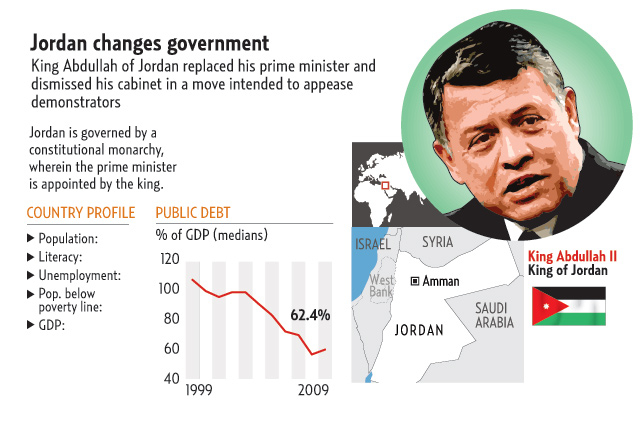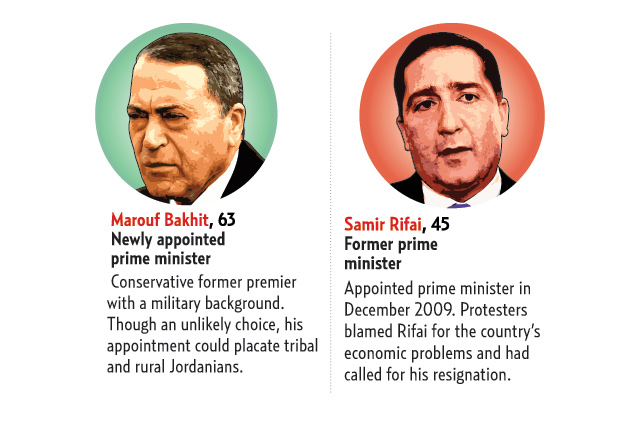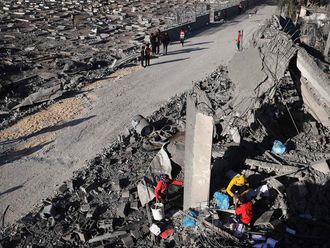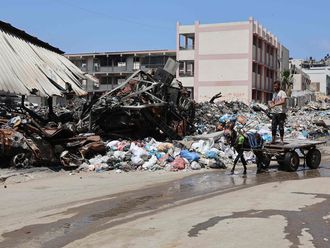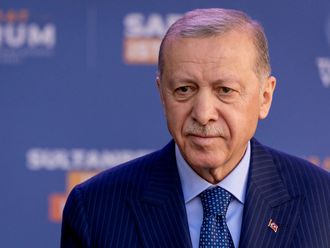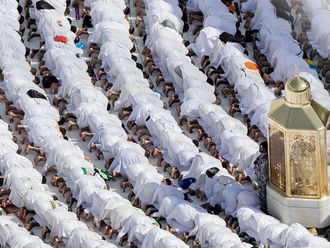
Ramallah: Jordan's king fired his cabinet and the Palestinian president promised to hold long-delayed elections as America's Mideast allies came under pressure for democratic reforms because of the popular protests sweeping Egypt.
But the Western push for reform in this tumultuous region has backfired in the past, strengthening extremists at the expense of pro-US moderates.
The Egyptian revolt against President Hosni Mubarak's 30-year rule has raised two urgent questions: Will it spread and perhaps destabilise other countries, and will it bring more democracy to the Arab world?
The democracy question is particularly pressing for US allies like Jordan and the Palestinian National Authority in the West Bank, which have long faced pressure from Washington to uphold democratic values.
Even as they loosen the reins a bit more and in the light of their moves on Tuesday, Jordan's King Abdullah and Palestinian President Mahmoud Abbas appear concerned about inadvertently giving a boost to their Islamic rivals.
Control
Abbas feels he was already burned once, when his Fatah movement was trounced by Hamas in the 2006 parliament elections he called under intense US pressure. The following year, Hamas grabbed control of Gaza by force. In Jordan, Abdullah faces formidable opposition from the Muslim Brotherhood. Yesterday, Abdullah fired his government, bowing to public pressure for reform, including several large demonstrations inspired by events in Egypt as well as Tunisia earlier last month.
Popular participation
The king instructed the new prime minister, Marouf Al Bakhit, to correct mistakes of the past and lead "real political reforms, which must increase popular participation in the decision-making". Earlier this week, Abbas met with his security chiefs and told them to clamp down on any protests in support of the Egyptian demonstrators and to make sure anti-Israel marches don't turn violent, a senior Palestinian security official said yesterday.
Abbas told the chiefs he was concerned that loosening the grip could provide an opening to Hamas to destabilise the West Bank, said the official, who spoke on condition of anonymity because he was not permitted to discuss details of the meeting.
Despite such worries, Abbas' Cabinet promised yesterday to set a date next week for municipal elections. The vote, which was to have been held last July, was cancelled by Fatah at the last minute when it became apparent it would likely lose against independents. Hamas said at the time it would not participate.
Yesterday's announcement said elections would be held in the West Bank and Gaza, though Hamas again said it would not cooperate.
Even if Hamas stays home and votes are only cast in the West Bank, Abbas and Fatah would be taking a risk. Peace efforts with Israel are frozen and Abbas suffered another blow last week when the widely watched TV station, Al Jazeera, reported he secretly made major concessions to Israel, citing hundreds of leaked transcripts of negotiating sessions.
‘Police state'
In the West Bank, dissatisfaction is bubbling under the surface, particularly among young Palestinians who belong neither to Hamas nor Fatah, said Palestinian analyst Khalil Shikaki. "They feel that the West Bank is turning into a police state," he said.
Meanwhile, there have been stirrings of discontent among nations in the region that aren't US allies, notably Syria and Sudan.
Signing up in cyberspace
Syria is not a US ally, but they have been quietly inspired by events in Egypt. An online campaign called for anti-government demonstrations tomorrow and on Saturday in the Syrian capital Damascus.
"Together for a Day of Rage in Syria," read one Facebook page joined by more than 2,500 people. Another 850 joined a page backing Syrian President Bashar Assad who inherited power from his father in 2000.
In Sudan, calls for anti-government protests today were posted on a website. Earlier this week, dozens of university students demonstrated against price hikes, but were quickly arrested.


